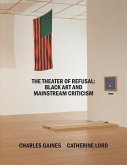A richly illustrated guide to the somatic, conceptual and conversational practice of the underrecognized artist duo Since their first encounter on the telephone in Los Angeles in 1977, artists Maren Hassinger (born 1947) and Senga Nengudi (born 1943) have formed an expansive body of collaborations, and a lifelong friendship that spans nearly five decades. While maintaining rigorous solo practices rooted in sculpture and installation, the artists first connected through a shared language of movement. Together they produced suites of dances and performances, and later videos, artist books and conceptual correspondences that vitalized their artistic practices. The artists' early work in Los Angeles emerged within a milieu that included David Hammons, Franklin Parker, Houston Conwill, and Ulysses Jenkins, and the loose collective of Black artists known as Studio Z. Yet since the mid-'80s, following their respective departures from the city, the two women have lived on opposite sides of the country, keeping their connection alive through a long-distance exchange. Created through an ethos of experimentation and support, Las Vegas Ikebana explores the longevity and transformative nature of the artists' collaborations as they evolved across decades, geographies and media. Published in conjunction with the first-ever exhibition on the artists' shared practice, Las Vegas Ikebana: Maren Hassinger and Senga Nengudi is the first monograph to survey the work of the pioneering duo. Richly illustrated, the publication assembles a plethora of never-before or rarely seen artworks and ephemera alongside images of the exhibition and a new performance titled See-See Riders, choreographed by Nengudi. Newly commissioned essays by critics, curators and artists trace the performative and conceptual working method of the two artists in distinct historical periods. The book includes a never-before-published 1987 conversation between Hassinger and Nengudi; an extensive oral history between the artists and their longstanding supporters, curators Lowery Stokes Sims and Leslie King Hammond; and original essays by the volume's editor and exhibition curator Allie Tepper, critics Kemi Adeyemi and Sampada Aranke and artist Steffani Jemison--all of whom expand upon the artists' crucial system of support that persisted in periods of institutional neglect. A complete annotated chronology of the artists' collaborations, as well as exhibition histories, also accompany the book.
Hinweis: Dieser Artikel kann nur an eine deutsche Lieferadresse ausgeliefert werden.
Hinweis: Dieser Artikel kann nur an eine deutsche Lieferadresse ausgeliefert werden.








